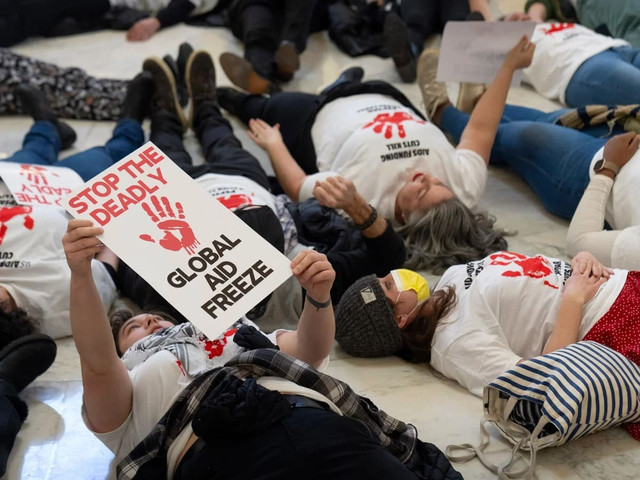Tentang KamiPedoman Media SiberKetentuan & Kebijakan PrivasiPanduan KomunitasPeringkat PenulisCara Menulis di kumparanInformasi Kerja SamaBantuanIklanKarir
2025 © PT Dynamo Media Network
Version 1.100.8
Konten dari Pengguna
Impact United States Foreign Aid Cuts Threaten Global Disease Fighting Efforts
International Relations Student 2022 Tanjungpura University, Pontianak. Interested in issues in International Relations.
Writing is part of my life.
Email: [email protected]/
Instagram: @oohseenn
7 April 2025 9:02 WIB
·
waktu baca 4 menitTulisan dari Husen Muhammad tidak mewakili pandangan dari redaksi kumparan

ADVERTISEMENT
Background to the Aid Cut
When Donald Trump officially began his second term as President of the United States on 20 January, one of the first steps he took was to order a three-month suspension of all foreign aid. The US government supported this policy on the grounds that USAID programmes are considered a form of wasteful spending. Observers see this policy as a fundamental change in the direction of US foreign policy, which now emphasises the principle of ‘America First’ rather than strengthening international relations through aid. The aid cut-off came on Trump's first day back in office. On the other hand, Washington DC District Judge Amir Ali stated that payments should still be made for completed projects, although he rejected requests from non-profit and private sector organisations asking that thousands of cancelled foreign aid contracts and grants be reinstated.
ADVERTISEMENT
How Will Fragile Communities Be Affected?
The cancellation of contracts and grants will significantly hinder access to critical services such as medical care, nutrition programs, and emergency assistance services that many vulnerable populations around the globe rely on for their survival. Children will be particularly impacted, as food supplies sourced from American farmers remain unused in storage. Lives will be lost to treatable illnesses, leading to avoidable tragedies occurring on a daily basis. The IRC urges the U.S. government to revisit this policy and to place the well-being of aid-dependent communities at the forefront. Regrettably, the U.S. government's move to end thousands of humanitarian aid initiatives poses a serious threat to both public and global health. The International Rescue Committee (IRC) is among numerous organizations compelled to halt programs financed by the U.S. that focus on the prevention and treatment of infectious diseases across the globe. This decision raises the likelihood of disease outbreaks, endangering communities worldwide.
ADVERTISEMENT
Impact on Health Programmes
In a virtual press conference from Geneva on Wednesday (12/2/2025), WHO Director-General Tedros Adhanom Ghebreyesus said that the US government's decision to stop foreign aid has disrupted health services in many countries. He expressed concern over a number of US policies that are considered to have a serious impact on global health.
One of the programmes directly affected is the President's Emergency Plan for AIDS Relief (PEPFAR), which previously funded HIV treatment, testing and prevention in 50 countries. With the budget cuts, health services that relied on this programme suffered major disruptions. Tedros stated that many clinics were forced to close and medical personnel lost their jobs.
ADVERTISEMENT
WHO is currently trying to provide support to countries that are experiencing shortages of anti-retroviral drugs due to this policy. Not only that, but the funding cuts have also affected polio eradication and mpox treatment programmes. In Myanmar, around 60,000 people lost access to essential medical services.
The decision by the United States government to significantly cut foreign aid under President Donald Trump's administration has had a profound and alarming impact on global health efforts. With the suspension of USAID programs long viewed as essential to supporting vulnerable communities through health care, nutrition, and emergency response many populations now face heightened risks, particularly in low-income countries. Organizations like the International Rescue Committee (IRC) have been forced to halt crucial initiatives that once helped prevent and treat infectious diseases, increasing the threat of deadly outbreaks worldwide. The termination of the PEPFAR program, which supported HIV-related services in over 50 countries, has already led to the closure of clinics and the dismissal of health workers, leaving countless individuals without access to lifesaving treatment.
ADVERTISEMENT
As students deeply concerned about global justice and humanitarian issues, we view this policy shift not only as a step backward in international solidarity but also as a failure to uphold the moral responsibility of powerful nations in supporting global health equity. This move undermines years of progress in disease prevention and sets a dangerous precedent where political agendas override human needs. We believe that such decisions should be reconsidered urgently, with a renewed commitment to collective health and global cooperation.
Muhammad Husen, International Relations Student, Tanjungpura University, Pontianak

